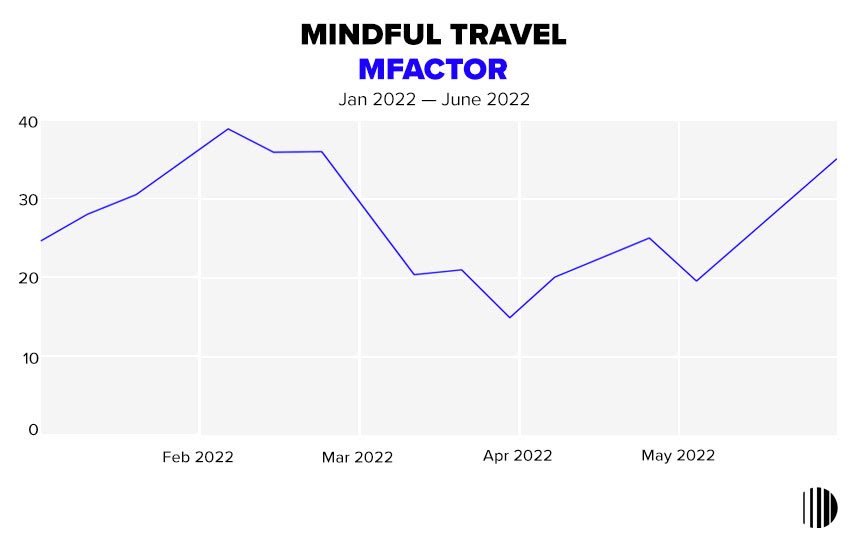The Secrets of Mindful Travel 🧘♀️🌎!!!!!!!
Travel is nearly back to pre-pandemic levels, as more and more people look for experiences that matter. Out of this desire, a new kind of tourism has emerged: ✨mindful travel.✨ It’s an approach to traveling — and to life — centered on the impact our decisions have on local communities and the environment.
To a mindful traveler, a trip isn’t about the destination. What’s most important is how the journey can be an opportunity for self-reflection, learning about different cultures, prioritizing sustainability, and giving back to the community they’re visiting.
The last several years have been a roller coaster of back-to-back crises, and more people are being diagnosed with stress, anxiety, and other mental health conditions than ever before. Is it any wonder why mindful travel is on the rise?
WHAT’S UP ⬆️:
Mindfulness is the next big thing in travel… and the tourism industry has taken note. Innovators are prioritizing accessibility and sustainability, while offering guests immersion in local communities, culturally meaningful experiences, and the opportunity to give back.
Airbnb: The homestay platform offers Social Impact Experiences for travelers who not only want to learn about the community where they’re staying, but truly support it. Any Airbnb host connected to a registered nonprofit can offer an experience that supports their cause. Airbnb even waives its 20% service fee for these, meaning every cent of what a traveler pays is reinvested into the local nonprofit.
Contiki: This travel company launched its Contiki Cares program in partnership with The TreadRight Foundation, a sustainable tourism nonprofit. Through the initiative, Contiki has launched a climate action plan; resources for sustainability-minded travelers; investments in community programs as well as in wildlife and nature conservation; and a strategy to achieve carbon neutrality by 2025.
Wild Rainbow African Safaris: This women-led company makes giving back an essential part of the safari experience. Their small group and personalized private tours facilitate donations to causes like the Cheetah Conservation Fund and the Bwindi Community Program, while guests participate directly with local sustainable organizations as part of the experience.
WHAT’S DOWN ⬇️:
Let’s call it “unconscientious travel” — stuff like boomer cruises and trips to selfie factories. After all, what’s the point of going somewhere if you can’t fully experience it? If you’re not willing to do your part to help sustain it so others can enjoy it, too?
WHAT’S NEXT ➡️:
| D Disruption |
The pandemic isn’t the only thing making folks rethink traveling. In response to the racial unrest that began in the summer of 2020, Joel Shackelford organized an 1,100-mile bike tour from Mobile, Alabama to Washington, DC — visiting landmarks associated with Black American history and the Civil Rights movement along the way. The new tradition was even documented by a film crew as the Underground Railroad Ride. |
| I Innovation |
The travel industry knows that conscientious travelers are a largely untapped market. That’s why the Prince Waikiki luxury hotel is bringing mindful travel to Oahu with the Malama Hawaii Package. In return for volunteering at local nonprofits and community initiatives like Sustainable Coastlines Hawaii, visitors get their fourth night free and receive perks like waived charges and discounts on resort services. |
| P Polarization |
After over two years of the pandemic, people are anxious to get out. But with gas prices at an all-time high, rising inflation, and the possibility of another Covid variant, they’re also hesitant. Is now really the right time to splurge? While travel is definitely on the rise, that dream vacation may not be in the cards just yet amid so much uncertainty. | S Stickiness |
Travelers are more conscious of their environmental impact than ever before. A 2021 Booking.com survey of 29,000 people across 30 countries showed that 83% of travelers think sustainable travel is vital, and 49% believe there aren’t enough sustainable travel options available. This year, a survey from The Vacationer found that 83% of all Americans believe sustainable travel is either somewhat important or very important to them, with 71% of adult Americans willing to pay more for a vacation in order to lower their carbon footprint. |
| S Social Impact |
Consumer preferences appear to be driving social change: travel providers are increasingly going greener. In 2020, United Airlines pledged to go 100% green by 2050, and JetBlue became the first U.S. airline to achieve carbon neutrality on all domestic flights. That same year, tour operator Intrepid (which has been carbon neutral since 2010) launched a seven-point climate emergency plan to reduce its greenhouse gas emissions. These are only a handful of the many travel companies that have committed to reducing their environmental impact. |

